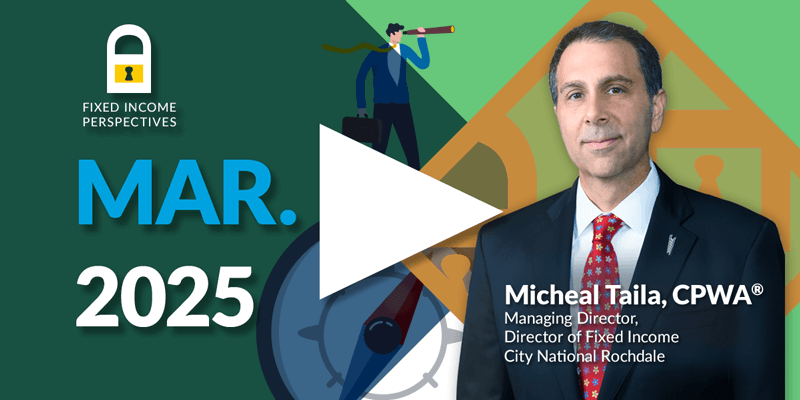-
Market Perspectives
September Starts with a Familiar Tone
September 2024
- Filename
- Market Perspectives SEPTEMBER 2024.pdf
- Format
- application/pdf
TRANSCRIPT
While the birthstone for September is blue sapphire, investors saw a lot of red on their stock screens to start the month. If history is any guide, it’s business as usual.
Dust off your copy of the “Stock Trader’s Almanac,” and it will tell you that September has historically been the worst month of the year for the S&P 500, NASDAQ, Russell 2000 and Dow Industrials.
After the attention-getting pullback in early August, which was driven by economic growth concerns, greater tech earning scrutiny, the unwinding of the carry trade and systemic funds selling pressure, the S&P 500 rebounded and finished August with a greater than 2% monthly gain.
Renewed growth fears led major indices to start this month with their steepest weekly declines in more than a year. Despite the recent drops, crucial price levels have not been breached, and good news outweighs the bad.
Importantly, corporate earnings continued to be positive.
S&P 500 Q2 Y/Y Earnings Growth &
Q2 Earnings vs. Consensus Estimates

Sources: FactSet, as of August, 2024.
Information is subject to change and is not a guarantee of future results.
Charts 1 & 2, 1:13— After a strong earnings season, focus turns to the third quarter. Second-quarter S&P 500 earnings grew by 10.9%, the strongest since the fourth quarter of 2021 and 2.4% above expectations.
Although the share of companies lowering guidance for the third quarter was above historical averages, the number of companies issuing negative guidance was the lowest since the fourth quarter of 2022.
Importantly, breadth in earnings estimates continues to improve as many sector estimates are now higher than they were midyear. City National Rochdale expects 2024 corporate profit growth to be between 9% and 12% and 2025 growth between 8% and 12%.
Let’s shift to politics.
The respective conventions are in the rearview mirror, and we’ve had our first presidential debate. We’re less than two months away from November 5. The elections will surely increasingly dominate the headlines, much ink will be spilled, and the chatter will be borderline deafening.
But does the stock market really care who controls the White House and Congress?
S&P 500 Returns
(1933-2024)

Sources: CNR Research, Bloomberg, as of August 2024.
Information is subject to change and is not a guarantee of future results.
Chart 3, 2:26— Looking back 90+ years, S&P 500 returns have been positive with all combinations. If one dug deeper into each of these scenarios, it’s likely one would find that economic fundamentals, corporate earnings and interest rate trends mattered more than the donkey or the elephant.
In other words, market performance doesn’t strongly correlate with government control, and any sector benefits from the elected candidate are usually temporary.
Election 2024 – Too Close to Call

Source: www.270towin.com, polymarket.org, as of August 2024.
Information is subject to change and is not a guarantee of future results.
Chart 4, 2:55— At the moment, the election is too close to call. The upcoming tight presidential and congressional races may increase market volatility. A divided government remains the most likely outcome, limiting significant policy shifts. Tariffs, taxes and treasuries are key areas of focus.
There’s still a ways to go –to sum up our current macro view, the global economic outlook is stable. U.S. growth is strong but moderating. Cooling inflation is paving the way for a Federal Reserve easing cycle. Job and income growth are supporting consumer spending. Lower interest rates should support a pickup in business investment. Elevated equity valuations in some sectors reflect strong corporate profits. Geopolitical events remain a key risk to the outlook. Our equity strategy emphasizes quality, market competitiveness and financial robustness.
We recommend an overweight in semiconductor, financial and healthcare sectors, and an underweight in real estate and materials.
Important Information
The views expressed represent the opinions of City National Rochdale, LLC (CNR) which are subject to change and are not intended as a forecast or guarantee of future results. Stated information is provided for informational purposes only, and should not be perceived as personalized investment, financial, legal or tax advice or a recommendation for any security. It is derived from proprietary and non-proprietary sources which have not been independently verified for accuracy or completeness.
While CNR believes the information to be accurate and reliable, we do not claim or have responsibility for its completeness, accuracy, or reliability. Statements of future expectations, estimates, projections, and other forward-looking statements are based on available information and management's view as of the time of these statements. Accordingly, such statements are inherently speculative as they are based on assumptions which may involve known and unknown risks and uncertainties. Actual results, performance or events may differ materially from those expressed or implied in such statements.
Past performance or performance based upon assumptions is no guarantee of future results.
All investing is subject to risk, including the possible loss of the money you invest. As with any investment strategy, there is no guarantee that investment objectives will be met and investors may lose money. Diversification does not ensure a profit or protect against a loss in a declining market.
Equity investing strategies & products. There are inherent risks with equity investing. These risks include, but are not limited to stock market, manager or investment style. Stock markets tend to move in cycles, with periods of rising prices and periods of falling prices.
Fixed Income investing strategies & products. There are inherent risks with fixed income investing. These risks include, but are not limited to, interest rate, call, credit, market, inflation, government policy, liquidity or junk bond risks. When interest rates rise, bond prices fall. This risk is heightened with investments in longer-duration fixed income securities and during periods when prevailing interest rates are low or negative.
City National Rochdale, LLC is an SEC-registered investment adviser and wholly-owned subsidiary of City National Bank. Registration as an investment adviser does not imply any level of skill or expertise. City National Bank is a subsidiary of the Royal Bank of Canada.
© 2024 City National Rochdale, LLC. All rights reserved.
Index Definitions
The Standard & Poor’s 500 Index is a market capitalization-weighted index of 500 common stocks chosen for market size, liquidity, and industry group representation to represent US equity performance.
The Russell 2000 Index is a stock market index that measures the performance of the 2,000 smaller companies included in the Russell 3000 Index.
NASDAQ Composite: is a stock market index that includes almost all stocks listed on the Nasdaq stock exchange. Along with the Dow Jones Industrial Average and S&P 500, it is one of the three.
Dow Jones Industrial Average: U.S. Select Dividend Index aims to represent the U.S.'s leading stocks by dividend yield.
Stay Informed.
Get our Insights delivered straight to your inbox.
Put our insights to work for you.
If you have a client with more than $1 million in investable assets and want to find out about the benefits of our intelligently personalized portfolio management, speak with an investment consultant near you today.
If you’re a high-net-worth client who's interested in adding an experienced investment manager to your financial team, learn more about working with us here.



